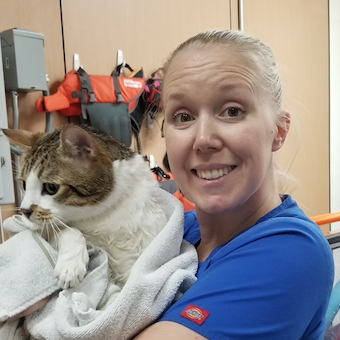Anecdotally, we can all feel veterinary medicine is at a tipping point. We are ready for change. And, once you dig into the data, it becomes pretty clear why — culture. You might feel culture in your practice is okay, but the data tells us the people of vet med need a more intentional and robust focus on culture from their employers. Otherwise, stress factors build and threaten your people and business. Below, we’ve compiled 22 veterinary statistics on the current culture challenges in vet med:
Veterinary Mental Health Statistics
- Only 26.1% of veterinary support staff say they’re doing mentally “well” (Merck)
- 56.5% of veterinarians classify themselves as mentally well (Merck)
- Serious psychological distress increased from 6.4% to 9.7% from 2019 to 2021(Merck)
- For veterinary staff specifically, 18.1% experience serious psychological distress (Merck)
Veterinary Mental Health Support Statistics
- Only 35% of psychologically distressed veterinary professionals said that mental health care was accessible via their employer (Merck)
- 59% of veterinarians with serious psychological distress knew they needed help within the past year but didn’t or couldn’t get it (Merck)
- Less than 30% of veterinary professionals have access to an employee assistance program (Merck)
Veterinary Burnout Statistics
- 50% of veterinary staff report they are experiencing high levels of burnout (Merck)
- 69% of veterinary professionals who said they were experiencing high levels of burn out, characterized their practice as “chaotic” (Merck)
- 86% of veterinary professionals say their employer doesn't have a clearly defined burnout prevention program (VIS)
- Nearly 70% of veterinary professionals would like for management to help them achieve better work-life balance (VIS)
- 38% of veterinary professionals said that hiring more staff would help with their work/life balance (VIS)
- About 30% of companion animal veterinarians said they wanted to work fewer hours (AVMA)
- The average number of appointments booked increased 4.5% from 2019 to 2020. (AVMA)
Veterinary Career Outlook Statistics
- Only 47% of veterinarians recommend vet med as a career (Merck)
- 1 in 5 veterinarians regret becoming a veterinarian (Merck)
- 31% of veterinary staff said they are “very likely” to leave vet med in the next two years (Merck)
- Veterinary technicians turnover at a rate of 26% - one of the highest in the whole healthcare profession (AVMA)
- Veterinarians turnover at a rate of 16% - twice that of medical doctors (AVMA)
Veterinary Team Culture Statistics
- Less than half of veterinary professionals think their practice has a strong sense of belonging and trust (Merck)
- Only 11.4% of veterinary professionals would categorize culture in vet med as “good” (hound)
- Togetherness was the #1 reason veterinary professionals thought their team culture was “good.” (hound)
Let’s build a better, brighter future — together.
Flipping these statistics might seem like a big hill to climb, but we are confident Vet Med can solve this together. Being intentional about the culture you build, defining and living your purpose, and working to bring your people together is an investment every veterinary employer should make. Doing so will empower the people of veterinary medicine to do our greatest good.
Want to learn how to create and sustain healthy culture? Read the Ultimate Guide for Awesome Culture in Veterinary Medicine.
Ready to commit to improving your culture? Sign the Veterinary Culture Manifesto.




.gif)


